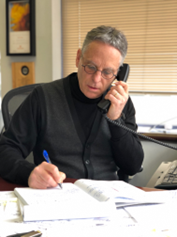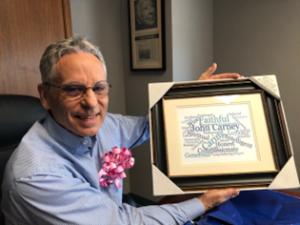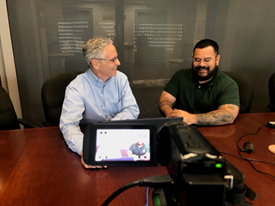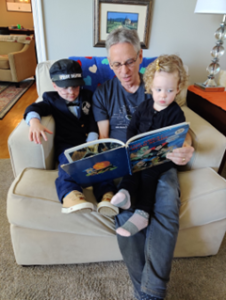John G. Carney: A Career in Ethics
John G. Carney:
A Career in Ethics
John Carney has always been fascinated by how people make decisions, in particular decisions about health and healthcare.
Take advance care planning. Eighty percent of people surveyed say they should have an advance directive but don’t.
“That’s because it’s really hard,” said Carney. “People don’t project themselves well into the future. A person might say now that they wouldn’t want a feeding tube at some point in the future, but what they may really be saying is that they value their independence.
“Advance care planning should encourage people to talk about their values, so that those who care for them, perhaps decades later, can develop treatment plans based on what’s truly important to them. If independence is one of your deepest values, then we should be asking how we can protect your independence within the limitations of your current condition.
“Unfortunately, too many misunderstand advance care planning as a medical event when it should be an exploration of what’s important to the patient and their family.”
Becoming a Leader
 Carney’s interest in profound questions about life and death probably grew out of his upbringing as a thoughtful young man in a large, Catholic, Midwestern family. After graduating from Newman University in Wichita with his B.A in Philosophy and English in 1975 and a master’s degree in Counseling from Wichita State University in 1978, Carney spent the next eight years learning more about community service and honing his management skills by directing a half-way house for troubled teens, a youth employment program with the City of Wichita, allocations and planning at United Way of the Plains, and volunteer programs for the Catholic Diocese of Wichita.
Carney’s interest in profound questions about life and death probably grew out of his upbringing as a thoughtful young man in a large, Catholic, Midwestern family. After graduating from Newman University in Wichita with his B.A in Philosophy and English in 1975 and a master’s degree in Counseling from Wichita State University in 1978, Carney spent the next eight years learning more about community service and honing his management skills by directing a half-way house for troubled teens, a youth employment program with the City of Wichita, allocations and planning at United Way of the Plains, and volunteer programs for the Catholic Diocese of Wichita.
In 1986, Carney was invited to apply for and was appointed President and CEO of the now Harry Hynes Hospice as it was just getting started. During 15 years as CEO, he became familiar with the Center for Practical Bioethics, as his leadership role in expanding hospice services statewide intersected with the Center’s advance care planning initiatives, including the multi-year Community-State Partnerships to Improve End-of-Life Care Project.
Carney worked in Washington, D.C., from 2000 to 2004 serving as Chief Operating Officer for the National Hospice and Palliative Care Organization and as Managing Director of the Academy for Healthcare Management at AHIP (America’s Health Insurance Plans). During that time, Myra Christopher, founding President and CEO of the Center for Practical Bioethics, occasionally prodded him by asking: When are you going to come back to the Midwest and work at the Center? In 2004, his answer was affirmative.
As Vice President of Aging and End of Life from 2004 to the end of 2010, Carney’s work at the Center included leadership roles on the Pediatric Palliative Care Project, the Aging in Community Initiative and a number of policy initiatives, as well as launching TPOPP/POLST in Kansas and Missouri. POLST is a voluntary program seeking to align treatment plans with the goals and values of seriously ill patients living with life-limiting illness across care settings.
Carney was appointed the second President of the Center in December 2011, following Christopher‘s announcement of plans to step away from the presidency.
There They Go
In his early years of directing a rapidly growing hospice organization, Carney kept a sign on the back of his office that said a lot about his style of leadership. It read, “I must hurry, for there they go and I am their leader.” It was a riff on a quote from the great Indian leader Mahatma Gandhi.
“Figuring out how to allow people you work with to thrive and make their contribution is an art,” he said.
 Carney cites two more recent accomplishments that illustrate his efforts to nurture the best from his team, the first being the Center’s shift from a charitable model of support to a more business-focused model of value-based services. Carney led the design and implementation of Ethics Direct/Ethics Plus Services beginning in 2018. The design supports health providers entering into formal fee-based affiliate agreements with the Center designed to improve ethics committees service delivery, clinical staff ethics skills, and ethics consultation competencies.
Carney cites two more recent accomplishments that illustrate his efforts to nurture the best from his team, the first being the Center’s shift from a charitable model of support to a more business-focused model of value-based services. Carney led the design and implementation of Ethics Direct/Ethics Plus Services beginning in 2018. The design supports health providers entering into formal fee-based affiliate agreements with the Center designed to improve ethics committees service delivery, clinical staff ethics skills, and ethics consultation competencies.
“John’s vision has been essential to the growth of programs like Ethics Plus, and his strongest leadership quality is trust in his team,” said Ryan Pferdehirt, Director of Membership and Ethics Education. “Ethics Plus involves the Center in some of the most challenging patient situations. Our ability to help patients, families and their providers in these situations is much easier knowing that John is there to support us with his expertise.”
Another accomplishment that resulted from his leadership was the development of two new mission-aligned program areas – Technology/Science and Population Health – and a new approach to advance care planning, particularly in diverse communities of culture and color.
In the area of Technology and Science, Carney cultivated the passions of staff members Lindsey Jarrett, PhD and Matthew Pjecha, MS in addressing the promise and risk posed by artificial intelligence in healthcare. The resulting Ethical AI Initiative is using an innovative community-based participatory research model to develop recommendations and best practices for adherence to an ethics framework in the development, dissemination and use of AI systems in healthcare.
In Population Health, the Center is focusing on social determinants of health, factors like geography, education, socio-economic status, and race that influence health at a group level. Erika Blacksher, PhD, who succeeded the late Richard Payne, MD, as the John B. Francis Chair in Bioethics at the Center in September 2020, is leading the Civic Population Health Project. The next step in this multi-year effort is to create a toolkit to convene diverse Kansans and Missourians to learn and talk together about our most pressing population health challenges. If pilot tests are successful, it could serve as a template for similar efforts nationwide.
 In advance care planning, Carney has long understood that conversations with physicians and completion of documents don’t work well in non-majority populations where lack of access to and distrust of the healthcare system is warranted and widespread. Building on Dr. Richard Payne’s breakthrough work to promote advance care planning in African American faith communities, Carney has championed efforts of staff member Polo Camacho, PhD, to develop culturally sensitive programming in the Latino community.
In advance care planning, Carney has long understood that conversations with physicians and completion of documents don’t work well in non-majority populations where lack of access to and distrust of the healthcare system is warranted and widespread. Building on Dr. Richard Payne’s breakthrough work to promote advance care planning in African American faith communities, Carney has championed efforts of staff member Polo Camacho, PhD, to develop culturally sensitive programming in the Latino community.
Top Issues
Carney’s frustrations as CEO reflect what he sees as the most important ethical issues in health and healthcare today.
“Structural racism is the most hidden and insidious illness we face as a nation, and those of us in power have no idea of the work we have to do,” he said. “Just look at the fact that access to healthcare remains unavailable to more than 10% of the population and, despite widespread support locally among citizens, efforts at expanding Medicaid services in Kansas and Missouri are fraught with challenges – not only for communities of color but for poor persons, those who live with disabilities, refugees and those whose first language is not English.
Public health is next on Carney’s list of concerns.
“Even after vaccines for COVID were made available, the fractured state of our pandemic preparedness and response, the politicization of public health, and mis- and disinformation is estimated to have cost thousands of lives,” he said. “Attacks on public health workers threaten local and regional emergency and disaster response systems. Full recovery cannot begin until erosion of trust in public health is restored.”
Last, but not least, when faced with challenging problems in health and healthcare, Carney calls for greater effort to proactively address the ethical aspects of problems rather than wait to react to bad outcomes. Responding to this need, he says, has several prerequisites.
First, it requires funders to recognize that this work is worth paying for and that it should include all voices, not just from academia and public officials but from the people who live in affected communities.
Second, it requires clinicians to understand that their job is not to translate the rules of medicine to consumers; their job is to determine how to make the healthcare system respond to the values and desires of their patients. All of which requires a complete reframe of our duty of care.
Finally, it requires more clinical ethicists working side-by-side with health professionals to identify, analyze and resolve ethical issues that arise in their facilities, from the care of individual patients to policies that affect the institution and the communities they serve as a whole.
Board Strength
 The challenge for the Center going forward, in Carney’s view, is to be deliberate and not become distracted. His decision to retire as President and CEO was based, in no small part, on his confidence in the board of directors and their ability to find the next leader for the Center.
The challenge for the Center going forward, in Carney’s view, is to be deliberate and not become distracted. His decision to retire as President and CEO was based, in no small part, on his confidence in the board of directors and their ability to find the next leader for the Center.
“We have expanded diversity of board membership along with heightened awareness of the ethical implications of social determinants of health on our work,” he said. “The board’s maturing reflects their readiness to embrace the mission and vision in a way that can chart our future course. The vision is theirs – it belongs to the community.
“Working with the board,” he continued, “has been one of the most rewarding experiences of my life. Their enthusiasm, creativity and willingness to roll up sleeves and be involved has been inspiring and encouraging. Nearly half of them have expressed interest in serving in board leadership.”
Board members feel similarly about Carney.
“John’s leadership is respected not only by the Board but stakeholder groups as well,” said Stephen Salanski, Board Vice Chair. “I saw that in the work we did with the Mid-America Regional Council on COVID response and equitable vaccine distribution, as well as at the state level and through collaborations with organizations throughout the healthcare industry.”
“John has a deep level of knowledge and believes in the Center’s mission and vision,” said Eva Karp, Board Chair, “which makes him a powerful leader and partner with the Board of Directors.”
Carney announced his intention to retire by the end of 2022 more than two years ago, but admits that the pandemic helped to confirm his decision.
“The daily zoom meetings, the technology, the loss of ‘place’ have taken their toll on me,” he said.
Moral Imperatives
Beyond the impact of COVID-19 on him personally, Carney remains deeply concerned about the evisceration of public health and sees reversing it as a moral imperative.
“State and local public health resources in Missouri and Kansas have been devastated by politicization,” he said. “There is no confidence in it, no money, no investment. Until trust in public health is restored, vulnerable Americans remain at risk.”
With a new leader in place at the Center, Carney says he’s going to take the advice of many to not rush into things. For starters, his focus will be on six grandchildren aged eight and under with another on the way. Maybe he’ll read or be read to by kids in area schools, learn to speak Spanish again and become a more active community volunteer.
He’s also envisioning more time tending his gardens, with the (eventual) goal of becoming a master gardener.
“I’ve learned that executives who face uncertainties in complex situations often find a little solace in seeing something come to completion by doing puzzles,” he said. “I get a lot of comfort in nurturing plants and sharing them with people…and insects. That’s my reward. I spend a lot of time in reflection and awe. It’s humbling though, because just when you think you have it made, Mother Nature surprises you with an early freeze or little critters that chew up favorite plantings overnight. It’s good for the soul.”
Extending the metaphor, he continued, “There will always be weeds in our lives. Our job is to accept that pulling them by hand is healthier and more wholesome than using quick fixes like chemicals.”
Carney noted that he’s learned so much in the last few years about getting in touch with just how much he didn’t know, especially about power and race.
“I’ve had some good mentors and colleagues, along the way” he said. “COVID has been a hard teacher, but people have been patient, kind and understanding. I need to spend the last chapter in my life getting better at that – being patient and kind and more understanding.
“It’s been a good ride and I’m grateful that I got to spend the last 18 years or so with the folks here at the Center. I owe a lot to others, and I’ll always be grateful for the guidance and support of good colleagues along the way.”
Make an impact
Every dollar you give helps providers, clinicians, patients and families decide what to do when it’s hard to agree about the “right” thing to do.


